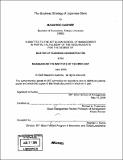| dc.contributor.advisor | Michael A. Cusumano. | en_US |
| dc.contributor.author | Kashibe, Masahiro | en_US |
| dc.contributor.other | Sloan School of Management. | en_US |
| dc.coverage.spatial | a-ja--- | en_US |
| dc.date.accessioned | 2007-04-03T17:14:05Z | |
| dc.date.available | 2007-04-03T17:14:05Z | |
| dc.date.copyright | 2006 | en_US |
| dc.date.issued | 2006 | en_US |
| dc.identifier.uri | http://hdl.handle.net/1721.1/37122 | |
| dc.description | Thesis (M.B.A.)--Massachusetts Institute of Technology, Sloan School of Management, 2006. | en_US |
| dc.description | Includes bibliographical references. | en_US |
| dc.description.abstract | The fundamental role of the System Integrators (Slers) is to provide customized IT systems or services that satisfy the unique requirements of each customer by integrating the various products and services that many IT companies produce. Originally, the IT companies in the different business segments such as the consulting business, hardware business, and software product business have complemented each other, and Slers played the roles of coordinators between these various IT companies and the customers. However, the business model of IT companies is rapidly changing. The firewalls separating business segments in the industry are becoming obsolete, and the Japanese Slers are now getting involved in the intense new competition. This thesis identifies key elements that influence the future business of Japanese Slers. It also proposes sound strategies that will enable Japanese Slers to grow solidly from the viewpoint of top management. From the technological viewpoint, my research finds that the commoditization and openness of technologies have made hardware and software product companies shift their business focuses from products to services. On the other hand, from the market viewpoint, customers are implementing the strategies that select and focus on core businesses. | en_US |
| dc.description.abstract | (cont.) Customers are actively trying to find outsourcing opportunities. The enterprise IT systems are no exception. Customers are trying to maximize business value using IT by distinguishing strategic systems that should be customized and owned by themselves from commodity systems that should reduce costs by adopting outsourcing services. Under these changing environments, Slers will be unable to maintain the sustainability of their business simply by improving their current core competency: system integration. I argue that Slers should create new relationships with complementers. Developing open-application platforms and sharing them with IT service providers widely will allow Slers to create a new software ecosystem that will provide mutually beneficial relationships with their current competitors. The Slers should not focus on cost reduction in offshore development; rather, global sourcing and global business expansion should be the center of the strategies for offshoring. I also show that the development of consulting services and the hybrid services that combine outsourcing and system integration services will be the keys to further growth. | en_US |
| dc.description.statementofresponsibility | by Masahiro Kashibe. | en_US |
| dc.format.extent | 171 p. | en_US |
| dc.language.iso | eng | en_US |
| dc.publisher | Massachusetts Institute of Technology | en_US |
| dc.rights | M.I.T. theses are protected by copyright. They may be viewed from this source for any purpose, but reproduction or distribution in any format is prohibited without written permission. See provided URL for inquiries about permission. | en_US |
| dc.rights.uri | http://dspace.mit.edu/handle/1721.1/7582 | |
| dc.subject | Sloan School of Management. | en_US |
| dc.title | The business strategy of Japanese Slers | en_US |
| dc.title.alternative | Business strategy of Japanese System Integrators | en_US |
| dc.type | Thesis | en_US |
| dc.description.degree | M.B.A. | en_US |
| dc.contributor.department | Sloan School of Management | |
| dc.identifier.oclc | 85774325 | en_US |
